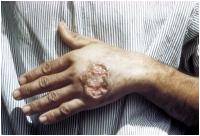Scientists have come out with a novel diagnostic approach which will assist in the fight against Chagas disease, notorious for being one of the most deadly parasitic diseases in the world.

The symptoms are variable, but as the disease progresses serious chronic symptoms can appear, such as heart disease and malformation of the intestines.
Most people affected may remain without symptoms for years, making diagnosis difficult.
Chagas disease is also transmitted from mother to unborn child and can be passed on for as many as four generations without symptoms.
There is an urgent need for action on this disease as it is under-diagnosed and there is no effective treatment.
This situation raises some serious public health concerns with respect to blood transfusions and organ transplants, because many people may be silent carriers of the disease.
Advertisement
The researchers have validated a reliable screening technique using mass spectrometry technology that identifies common biological markers - or biomarkers - between the interaction of host (humans) and the parasite.
Advertisement
"It's as if the parasite left his own signature in the infected person, which could help to diagnose Chagas disease," Dr. Ndao said.
"The use of these biomarkers is a revolution in diagnostic confidence and protection of possible contamination of blood banks.
"Moreover, these biomarkers have potential therapeutic effects of paving the way for the development of vaccines for Chagas, which could be extended to other parasitic diseases," Dr. Ndao added.
The results were recently published in the Journal of Clinical Microbiology.
Source-ANI
SAV









